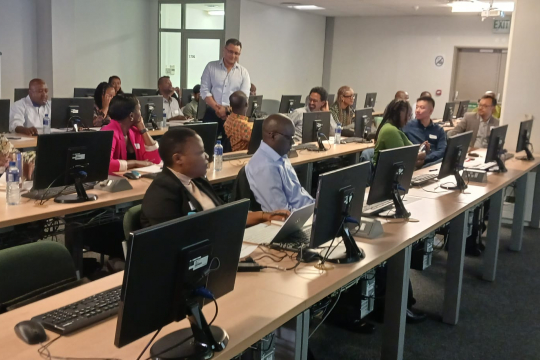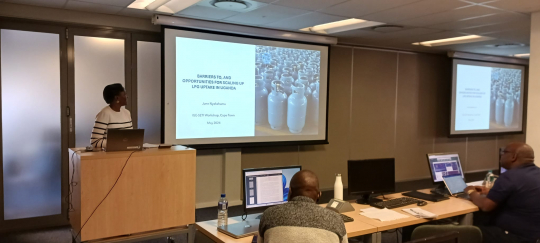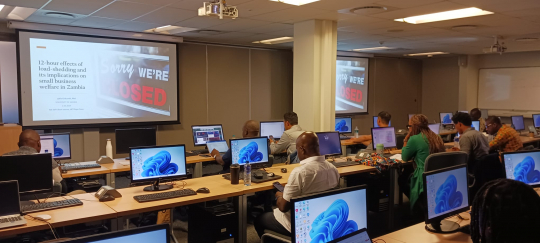Civil servants, policymakers, and researchers from across Sub-Saharan Africa have completed an intensive course, The Economics of Energy Transitions: Concepts, Methods, and Research for Policymaking, developed to address the urgent need for a sustainable energy transition in the Global South.
The course was taught by Marc Jeuland, co-leader of the Sustainable Energy Transitions Initiative (SETI) and Professor at Duke University, and financed by SIDA through the EfD peer-to-peer learning project Bridging the gap between biomass dependence and sustainable energy transitions: Translating global evidence into regional strategies.
Hosted at the University of Cape Town, the program provided policymakers with essential tools to address the complex challenges of sustainable energy transitions in low- and middle-income countries (LMICs), equipping them to make informed, evidence-based decisions.
Strong line-up of lecturers
The hybrid course structure, which spanned from March 18 to June 1, 2024, combined virtual lectures with an in-person intensive capstone session in Cape Town from May 27 to June 1, during which the lecturers provided hands-on instruction on developing policy-relevant research proposals). Alongside Marc Jeuland, distinguished academics from Africa and SETI fellows, including Amin Karimu from the University of Cape Town, Edward Bbaale from Makerere University, Abebe Beyene from the Policy Sciences Institute in Addis Ababa, Richard Mulwa from the University of Nairobi, and Remidius Ruhinduka from the University of Dar es Salaam, facilitated the program. Together, they equipped participants with skills in energy economics, policy evaluation, and applied research for the energy sector.
Addressed the challenging trade-offs
The course responded to the urgency of sustainable energy transitions in Sub-Saharan Africa, particularly as climate change impacts intensify. Recognizing the unique constraints facing LMICs as they shift from traditional fuels to cleaner energy sources, the program aimed to help African policymakers address critical economic and environmental trade-offs and advance the adoption of innovative energy solutions.
"Energy consumption is intricately linked to economic growth, but developing modern energy systems entails substantial trade-offs, in terms of public sector spending and implications on the environment and public health," explained Marc Jeuland.
"This course was created to address these trade-offs, focusing on the challenges and opportunities for LMICs to lead sustainable energy transitions, especially in Sub-Saharan African countries."
Explored real-world examples
The participants gained insights into the relationship between energy access and socioeconomic development at both micro and macro levels. By the end of the course, they had developed a practical understanding of the trade-offs of various energy technologies, acquired hands-on experience with quantitative methods for evaluating energy policies, and framed actionable research agendas specific to their countries’ energy transition challenges.
The course comprised three modules:
- Module 1: Foundational concepts in energy transitions and the unique challenges faced by LMICs, covering energy access inequality, financing constraints, quality of access, and externalities affecting both local and global scales.
- Module 2: Quantitative empirical methods applied to the energy sector, including program evaluation through experimental and quasi-experimental approaches.
- Module 3: An in-person capstone in Cape Town, where participants defined a local energy challenge, drafted a research agenda, and developed a strategy for evidence-based policy solutions.
Through interactive lectures, participants explored real-world issues, such as market failures, environmental externalities, and the political economy of energy reform, gaining insights on how to apply theoretical concepts to practical policymaking scenarios.
Provided tools for policy-making and collaboration
The program culminated in a final project where participants designed and defended a research plan addressing a key energy transition challenge in their home country. Working closely with peers and instructors, participants refined their ideas and devised strategies to overcome data and funding limitations. The collaborative environment fostered a supportive network of policymakers and researchers committed to driving sustainable energy solutions.
The course, part of SETI’s mission to bridge research and policy, empowered participants to return to their roles equipped with the critical skills and knowledge needed to lead energy policy discussions and initiatives. By providing tools for evidence-based policymaking, SETI has contributed to a growing network of African leaders ready to champion sustainable energy transitions in their countries.
Access to the recordings of the course
To access the recordings of the complete course, we invite you to visit this link.


